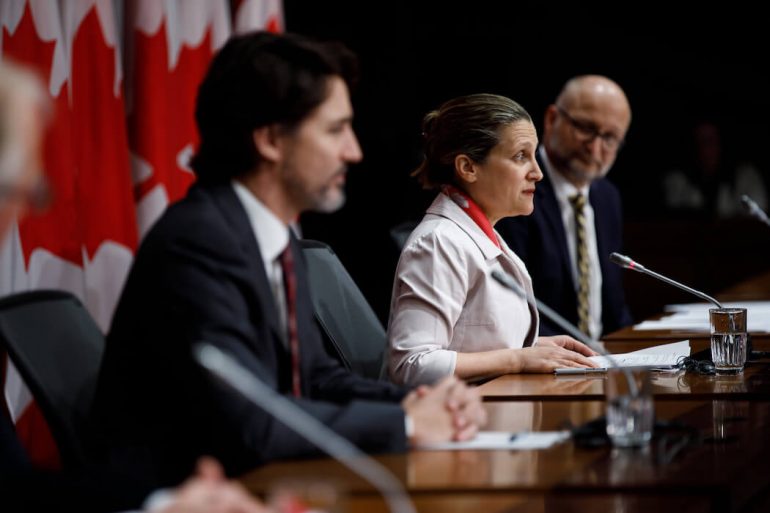While light on new funding for the country’s innovation economy, the federal government’s latest fiscal update did include some significant commitments to Canada’s tech sector.
The Government of Canada’s Fall Economic Statement, delivered today by Deputy Prime Minister and Finance Minister Chrystia Freeland, includes promises to implement a consumer-driven banking framework next year, expand Payments Canada eligibility, and bolster the country’s competition watchdog, as well as updates regarding the Clean Technology Investment Tax Credit and the Canada Growth Fund.
The federal government aims to implement the necessary governance framework for open banking by 2025.
The statement indicated that the Liberal government intends to amend the Canadian Payments Act to expand membership eligibility for Payments Canada (which is spearheading the delivery of a new Real-Time Rail payment system) to firms other than big banks, give the Competition Bureau more power to tackle anti-competitive deals and practices, and introduce legislation through Budget 2024 to make open banking a reality.
“This is the boldest move from the government to date: consumer-driven banking legislation in 2024, a policy statement signalling their direction, and amendments to the Canadian Payments Act later this year,” Fintechs Canada executive director Alex Vronces told BetaKit.
Canadian FinTech CEOs Michael Katchen of Wealthsimple and Andrew Graham of Borrowell both took to LinkedIn to express their pleasure following today’s announcement. “Open banking will dramatically improve financial services for consumers through innovation, convenience and competition,” wrote Katchen. “It will reduce costs for Canadians without compromising on privacy or security.”
The Fall Economic Statement aims to strike a balance between affordability concerns and fiscal responsibility, as the Liberals face pressure to rein in spending amid fears that too much could fuel even higher inflation as the economy continues to slow.
The Liberals’ latest fiscal update focused largely on housing, detailing commitments towards rental and affordable housing programs and cracking down on short-term rentals on platforms like Airbnb and Vrbo.
On the open banking front, FinTech leaders have been calling for the federal government to implement much-delayed open banking rules, which were previously promised for this year.
Last week, a group of Canadian tech leaders published an open letter to Freeland, urging her government to accelerate the rollout of Canada’s open banking framework. Others in Canada’s FinTech space have launched public campaigns in recent months pushing for faster action on the implementation of both open banking and payments modernization.
Following the introduction of associated legislation in 2024, the federal government aims to implement the necessary governance framework for open banking by 2025.
RELATED: “We are still waiting”: FinTech leaders urge Liberals to enact much delayed open banking rules
Council of Canadian Innovators (CCI) director of federal affairs Nicholas Schiavo hailed the feds’ commitment to implement open banking in 2024 as a positive. He noted that “the devil will be in the details, and Canadian innovators stand ready to work hand-in-glove with the government on developing the specific protocols and regulations between now and the 2024 budget.”
The Government of Canada also indicated that it plans to strengthen the tools and powers available to the Competition Bureau to help it crack down on abuses of dominance by bigger companies, modernize merger reviews, empower the Commissioner of Competition to review a wider selection of anti-competitive collaborations, and enable more private parties to bring cases before the Competition Tribunal.
The update identified “killer acquisitions” as one area of focus, as it looks to address cases where large, dominant firms take advantage of their market position and engage in anti-competitive behaviour.
As part of a push to keep pace with the United States, which passed a historic climate deal last year, Canada’s federal government promised a multitude of new cleantech and green economy tax measures in Budget 2023.
In its latest fiscal update, the Government of Canada indicated that legislation will be introduced this fall for the Carbon Capture, Utilization, and Storage Tax Credit and Clean Technology Investment Tax Credits. Consultations on draft legislation for Clean Hydrogen and Clean Technology Manufacturing tax credits will also kick off then, while other promised tax credits will be rolled out at a later date.
In its economic statement, the federal government also proposed to allocate roughly half of the $15-billion Canada Growth Fund, first established in Budget 2022, for special contracts intended to help companies invest in lowering their carbon emissions.
The Canada Growth Fund is aimed to bridge the liquidity gap in the Canadian cleantech market. Last month, the fund made its first investment into Calgary-based Eavor’s $182-million Series B funding round.
“Implementing the Clean Investment Tax Credit and the Canada Growth Fund will meaningfully disperse capital, drive investment and support innovators who are working to create the low-carbon economy we all want to see,” said Schiavo.
The Fall Economic Statement also contains a proposal to amend the Income Tax Act so that “concessional loans with reasonable repayment terms from public authorities” will not be considered government assistance. In late May, the Supreme Court of Canada dismissed an appeal application seeking to overturn an earlier decision by the Tax Court, which deemed below-market federal loans a form of government assistance, excluding them from being used in conjunction with SR&ED.
While Schiavo expressed relief that the feds are acting quickly to amend that issue, he also expressed disappointment that, yet again, the Government of Canada did not provide an update on the “long past due review” of the SR&ED tax credit.
Schiavo noted that CCI had also hoped to see new details on the Canadian Innovation Corporation and more support for the country’s semiconductor industry—neither of which were contained in Freeland’s update.
With files from Isabelle Kirkwood.
Feature image courtesy Flickr.

